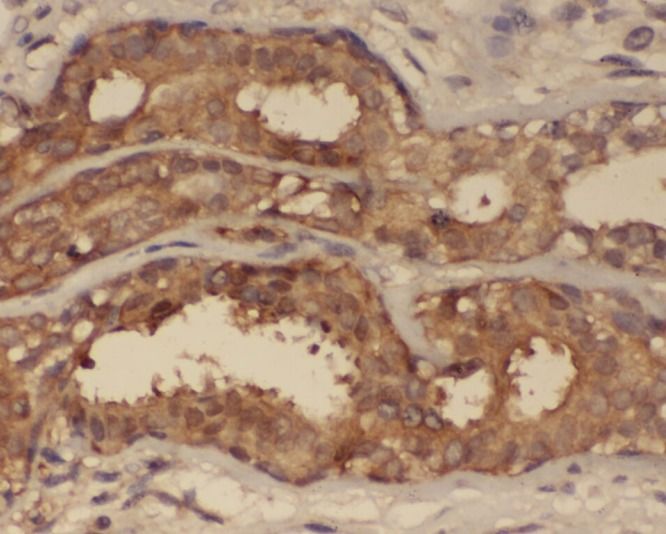Products
PKC beta antibody
Category:
Research Area:
| Synonyms: | PKC B antibody, PKC beta antibody, PKCB antibody, PRKCB antibody, PRKCB1 antibody, PRKCB2 antibody, Protein kinase C beta type antibody, protein kinase C antibody, beta antibody | ||
| Catalogue No.: | FNab06481 | Reactivity: | Human, Mouse, Rat |
| Host: | Rabbit | Tested Application: | ELISA, WB, IHC |
| Clonality: | polyclonal | Isotype: | IgG |
- SPECIFICATIONS
- Product Name
- PKC beta antibody
- Catalogue No.
- FNab06481
- Size
- 100μg
- Form
- liquid
- Purification
- Immunogen affinity purified
- Purity
- ≥95% as determined by SDS-PAGE
- Clonality
- polyclonal
- Isotype
- IgG
- Storage
- PBS with 0.02% sodium azide and 50% glycerol pH 7.3, -20℃ for 12 months (Avoid repeated freeze / thaw cycles.)
Immunogen
- Immunogen
- protein kinase C, beta
- Alternative Names
- PKC B antibody, PKC beta antibody, PKCB antibody, PRKCB antibody, PRKCB1 antibody, PRKCB2 antibody, Protein kinase C beta type antibody, protein kinase C antibody, beta antibody
- UniProt ID
- P05771
- Observed MW
- 80 kDa
Application
- Tested Applications
- ELISA, WB, IHC
- Recommended dilution
- WB: 1:500 - 1:2000; IHC: 1:50 - 1:200
Validated Images
 mouse brain tissue were subjected to SDS PAGE followed by western blot with FNab06481(PRKCB antibody) at dilution of 1:1000
mouse brain tissue were subjected to SDS PAGE followed by western blot with FNab06481(PRKCB antibody) at dilution of 1:1000
 Immunohistochemistry of paraffin-embedded human pancreas cancer using FNab06481(PRKCB antibody) at dilution of 1:50
Immunohistochemistry of paraffin-embedded human pancreas cancer using FNab06481(PRKCB antibody) at dilution of 1:50
- Background
- Protein kinase C (PKC) is a family of serine- and threonine-specific protein kinases that can be activated by calcium and second messenger diacylglycerol. PKC family members phosphorylate a wide variety of protein targets and are known to be involved in diverse cellular signaling pathways. PKC family members also serve as major receptors for phorbol esters, a class of tumor promoters. Each member of the PKC family has a specific expression profile and is believed to play a distinct role in cells. The protein encoded by this gene is one of the PKC family members. This protein kinase has been reported to be involved in many different cellular functions, such as B cell activation, apoptosis induction, endothelial cell proliferation, and intestinal sugar absorption. Studies in mice also suggest that this kinase may also regulate neuronal functions and correlate fear-induced conflict behavior after stress. Alternatively spliced transcript variants encoding distinct isoforms have been reported.



